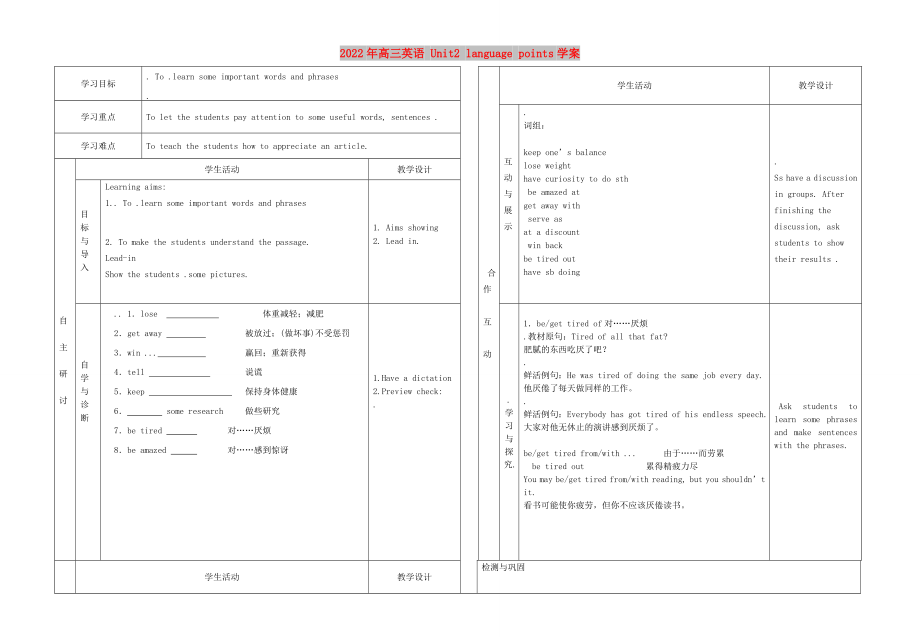《2022年高三英語(yǔ) Unit2 language points學(xué)案》由會(huì)員分享,可在線閱讀����,更多相關(guān)《2022年高三英語(yǔ) Unit2 language points學(xué)案(2頁(yè)珍藏版)》請(qǐng)?jiān)谘b配圖網(wǎng)上搜索。
1�����、2022年高三英語(yǔ) Unit2 language points學(xué)案
學(xué)習(xí)目標(biāo)
. To .learn some important words and phrases
.
.
合
作
互
動(dòng)
學(xué)生活動(dòng)
教學(xué)設(shè)計(jì)
學(xué)習(xí)重點(diǎn)
To let the students pay attention to some useful words, sentences .
互動(dòng)與展示
.
詞組:
keep one’s balance
lose weight
have curiosity to
2�、do sth
be amazed at
get away with
serve as
at a discount
win back
be tired out
have sb doing
.
Ss have a discussion in groups. After finishing the discussion, ask students to show their results .
學(xué)習(xí)難點(diǎn)
To teach the students how to appreciate an arti
3、cle.
自
主
研
討
學(xué)生活動(dòng)
教學(xué)設(shè)計(jì)
目標(biāo)與導(dǎo)入
Learning aims:
1.. To .learn some important words and phrases
2. To make the students understand the passage.
Lead-in
Show the students .some pictures.
1. Aims showing
2. Lead in.
自學(xué)與診斷
.. 1.lose 體重減輕���;減肥
2.g
4����、et away 被放過(guò)�����;(做壞事)不受懲罰
3.win ... 贏回;重新獲得
4.tell 說(shuō)謊
5.keep 保持身體健康
6. some research 做些研究
7.be tired 對(duì)……厭煩
8.be amazed 對(duì)……感到驚訝
1.Have a dictation
2.Preview check:
.
.學(xué)習(xí)與探究.
1.be/get tir
5���、ed of對(duì)……厭煩
.教材原句:Tired of all that fat?
肥膩的東西吃厭了吧��?
.
鮮活例句:He was tired of doing the same job every day.
他厭倦了每天做同樣的工作�����。
.
鮮活例句:Everybody has got tired of his endless speech.
大家對(duì)他無(wú)休止的演講感到厭煩了�。
be/get tired from/with ... 由于……而勞累
be tired out 累得精疲力盡
You may be/get tired from/with readi
6���、ng, but you shouldn’t it.
看書(shū)可能使你疲勞����,但你不應(yīng)該厭倦讀書(shū)��。
Ask students to learn some phrases and make sentences with the phrases.
檢
測(cè)
與
評(píng)
價(jià)
學(xué)生活動(dòng)
教學(xué)設(shè)計(jì)
檢測(cè)與鞏固
學(xué)習(xí)與探究
.
.
2.lose weight體重減輕�����;減肥
教材原句:Want to lose
7��、weight? 想減肥嗎��?
鮮活例句:She has been taking exercise to lose weight from day to day. 她每天鍛煉來(lái)減肥。
3.get away with被放過(guò)�����;(做壞事)不受懲罰��;把……卷跑����;偷走
鮮活例句:The headmaster won’t have students getting away with cheating in the exam.
校長(zhǎng)決不容許學(xué)生們考試作弊卻不受懲罰���。
4. have sb. doing 讓某人一直干某事
鮮活例句:The boss always has the worker
8�����、s washing the car.
Ask students to learn some phrases and make sentences with the phrases.
.
.
Practice:
1.I have never spent a day.
我從來(lái)沒(méi)有經(jīng)歷過(guò)比這更令人擔(dān)憂的一天了����。
2.Tom is intelligent student/all the other students in
9�、his class.
湯姆是他班上最聰明的學(xué)生。
3.Li Yang studies harder than ________ in his class.
李洋在班里學(xué)習(xí)最努力�。
4.He could not have_Yong_Hui_.____________ telling people lies!
他可不能讓雍慧哄騙人們卻不受懲罰!
5.I won’t such things about my sister.
我不允許你這樣說(shuō)我的姐姐��。
.長(zhǎng)難句分析
. 1.“Not
10、hing_could_be_better����,” he thought.
“再?zèng)]有比這些更好吃的了,”他想���。
此處比較級(jí)的否定形式表示最高級(jí)的含義�。
2.have sb. doing sth.用于否定句中�,意思是“不允許、不容
忍某人做某事”����。
.He won’t have his daughter arriving home late.
他不容許女兒晚回家。
3. It cost more than a good meal in his restaurant!
這比他在餐館里吃一頓好飯花的錢(qián)還要多��。
Analyse the difficult sentences.
.
課后反思:
 2022年高三英語(yǔ) Unit2 language points學(xué)案
2022年高三英語(yǔ) Unit2 language points學(xué)案

